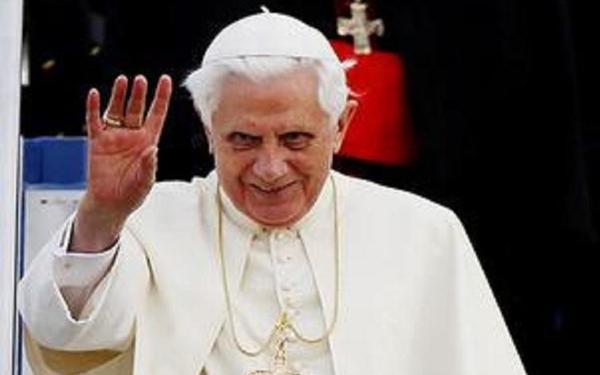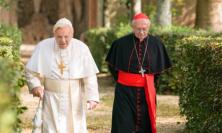As we continue to examine Pope Benedict’s recent encyclical on Thinking Faith and Pray-as-you-go this Advent, Frank Turner SJ looks at what Caritas in Veritate can offer to the secular public sphere. To what extent does the Pope address the global situation by commenting on policy rather than principles, and can the messages within magisterial literature be communicated to those who are used to debate rather than authoritative teaching?
Caritas in Veritate, addressing as it does themes of global social development, is rich in value and relevance for Christians working for international justice and peace in a secular context. My own environment in the Jesuit European Office in Brussels, is that of the institutions of the European Union. Parliamentarians and officials may or may not be Christian, may or may not be receptive to the Church and its proclamation. Other organisations to which our office relates also comprise both Christian and secular bodies. The way in which this encyclical can be understood and applied in such contexts, therefore, is for me an important question: how can a discourse addressed to ‘all people of good will’ be communicated to them?
I first note briefly certain specific policy observations made by the encyclical, before considering
this genre of ‘magisterial’ literature, in order to understand better what it can and cannot contribute.
The Encyclical’s Proposals
Caritas in Veritate (CV) includes a somewhat curious sequence of paragraphs in which the Pope offers rather cursory comments in turn on a broad range of current issues, some, though not all, of special relevance to the economic crisis which delayed the letter’s publication: responsible sexual behaviour in the face of population growth, and the ‘values of life and the family’ (§.44); international co-operation and development (§.47 and §.59-60); the environment (§.48 and §.50-51); energy (§.49); the right of access to education – and tourism (§.61); migration (§.62); unemployment (§.63); the rights and the proper focus of labour unions (§.64); the finance sector (§.65); consumer associations (§.66); and the need for a ‘true world political authority’ met in part by the necessary reform of the UN (§.67) so that – to quote the unconsciously amusing English translation – ‘the concept of the family of nations can acquire real teeth’ (§.67).
What can one make of this sweeping survey? The encyclical was issued at the beginning of the Swedish Presidency. I heard from a senior (Catholic) European official that informal discussion of its contents in the corridors of an early meeting in Stockholm was marked by some bewilderment. Clearly, none of these paragraphs will satisfy the political analysts, the sociologists and economists, who rightly debate each issue in detail; and the Pope obviously has no intention of settling such issues with magisterial authority. It is principles, rather than policies that occupy him: but he knows that speaking at the level of principles without applying them to the current situation is too easy and abstract.
Thus, when writing of development aid in §.60, the Pope writes from the very heart of his anthropology, invoking the principles of relationality and justice: ‘In the search for solutions to the current economic crisis,development aid for poor countries must be considered a valid means of creating wealth for all’ (emphasis in original). That is, it is crucial that the crisis does not impel the richer world to cut itself off and solve its own problems first. But within the same section he then writes, in a very different tone and at a different level, ‘One possible approach to development aid would be to apply effectively what is known as fiscal subsidiarity, allowing citizens to decide how to allocate a portion of the taxes they pay to the State. Provided it does not degenerate into the promotion of special interests, this can help to stimulate forms of welfare solidarity from below, with obvious benefits in the area of solidarity for development as well.’ To speak of ‘one possible approach’ is far from magisterial language.
This two-layered approach may be explained by some remarks of the Pope to the bishops attending the Synod of Africa in October, 2009. There is a double danger when speaking of social issues, he explained. The first is to focus too much on politics; the second is to be unrealistic. ‘Reconciliation, justice and peace are not possible without a profound purification of the heart’; yet the political dimension is also very real, because without political realisations these new things of the Spirit are not commonly realised. The opposite pitfalls are to ignore the pastoral and moral dimensions and focus on politics, ‘with a competence that is not ours’, or to retreat ‘into an abstract and beautiful but unrealistic world’.
In the spirit of the Pope’s remarks to the Synod Fathers, the rapid survey in CV seems designed to recommend a realistic and responsible attentiveness – on the part of Christians especially – to what is necessarily an ongoing expert discussion, among those who hold political responsibility and can speak with ‘a competence that is not ours’.
The sequence of ‘survey’ paragraphs inevitably appears ‘thin’ in policy terms: the positions proposed provoke questions which CV makes no attempt to answer. It is far from obvious, for instance, how the ‘true world political authority’ urgently demanded in §.67 would avoid being entangled among the problems that have always plagued the United Nations Security Council (the requisite unanimity, rarely attainable because of the veto; the dominance of a very few self-interested powers, etc.); yet these are the very problems that illustrate the need for such reform as is proposed here. As noted above (§.36) the Pope himself writes that the point is not to hold instruments as such to account: by the same token, it is less than ‘realistic’ to propose a new global instrument without further elaboration. Yet, these tentative policy proposals do not explicitly renounce magisterial status.
Problems of Genre
My intention in this final section is by no means to ‘criticise’ the encyclical, but to point to the methodological problem of bringing it to bear in secular spheres. I have sometimes presented Church Social Teaching (henceforth CST) fruitfully to Christian organisations which themselves engage in advocacy at the EU: but that is different from articulating the teaching directly in the political arena – or being invited to do so.
The ‘problem’ pertains not to this document, CV, as such, but to the whole genre of ecclesial literature called the magisterium – notably, in our present context, the encyclicals that comprise the central pillar of CST. Every literary genre has an inherent potential, and intrinsic limitations. In respect of potential, the Church has a kind of scope that no political institution enjoys, and many governments pay attention to it because of this. During the period leading up to the war against Iraq of 2003, the Christian churches were serious and respected interlocutors of some of the governments involved: I can speak at first hand of advocacy carried out in the UK. Part of the weight of the Church’s case derived from its universality. The Church is no less Iraqi than British: it is often far more open to the human experience and far more attentive to the actual and potential sufferings of those outside our own political circles. The Church’s universality is not merely an abstraction, and governments recognised that, even if sometimes grudgingly.
It seems to me that there are, however, certain intrinsic limitations of this literary genre. Since magisterial documents do not include methodological discussions, they do not draw attention to these problems. But it is positively helpful, not ‘disloyal’ for readers to acknowledge them.
The magisterial perspective of CVis the conscious expression of an over-arching teaching authority, holding together ‘natural law’ and ‘revelation’: it rests on both the operation of human reason (it can engage in discussion with those outside the Church, and with those of no religious belief), but also on Scripture as a privileged source of light to the Christian community. However, it functions in a social context where authority is plural, contested, fragmented, and where belief tends to be privatised. People will not usually accept magisterial claims unless their own experience gives prior ground for trusting the Church.
The magisterial mode, claiming authority, does not ‘debate’. CST, like magisterial documents such as theCatechism of the Catholic Church, tends to present conclusions and judgments without giving the reasoning behind those judgments: neither the arguments in favour nor the arguments that might count against the position taken are considered. The material itself is far from fundamentalist, but it occasionally invites a reception that is not far from fundamentalist – that is, it calls for assent to the conclusions, the explicit positions, not to the grounds for those conclusions. Since it does not seriously engage with counter-positions, it is unlikely to ‘persuade’ outsiders. It presumes authority, by definition: yet as suggested above, appeals to authority do not succeed in the argumentative world of secular politics.
This tendency is reinforced when Pope Benedict’s preferred usage, ‘Catholic Social Doctrine’ is favoured. (In CV, he uses both phrases: the expression ‘social teaching’ occurs four times, the expression ‘social doctrine’ more than twenty times.) To call it ‘doctrine’ explicitly removes it from the sphere of publicly contestable discourse. By the same token it perhaps leaves those outside the Church at a loss to know how to deal with it. For it is Pope Benedict’s entire position that Christian discourse is seamless, and what is proclaimed in the social realm fits into a broader context of the truth of faith. By definition, those who are not Catholic do not accept this interconnected body of proclamation: if they did they would logically become Catholic. For Catholics, revelation and reason are not antonyms. But this is not the kind of reason that prevails in the secular, political sphere. Pope Benedict speaks of ‘two types of reasoning: reason open to transcendence or reason closed within immanence’ (§.74). But what interests policy-makers is critical reason – arguments that invite and welcome constructive criticism so as to be later refined. CV is not such a document.[1]
In addition, the magisterial style is specifically Catholic. In practice, it leaves aside expressions of a ‘catholic-compatible position’ expressed by, say, a Protestant. To take one example, I know of no passage of magisterial teaching – and perhaps no passage of contemporary Christian writing – which meditates so searchingly and profoundly on the relationship between temporal commitments and the eschatological horizon as that on the ‘Ultimate and the Penultimate’ to be found in Bonhoeffer’s Ethics. To suggest this does not make me Protestant. But it perhaps suggests that Catholic social teaching is most effectively used when it is seen in a broader theological context – a context to which it does not explicitly refer.
This genre of social encyclicals written with the authority that rightly requires the respect of the Catholic community offers a rich and eloquent expression of the relationship of faith to contemporary human life. However, it is neither congenial to, nor readily understandable by, a consciously secular democracy. That culture proceeds by debate, by mutual criticism, at best courteous and mutually enriching, at worst strident and itself capable of fundamentalisms, such as the reductionist secularism that methodologically disallows any search for deeper horizons. To engage with that world requires a certain discipline that remains faithful to the Gospel. To make the best use of this instrument, we need to use it with discretion.
It follows, too, that magisterial discourse presumes the vitality of a theological discourse that is properly critical, which engages the very positions of the magisterium. Once questioning stops, answers lose their relevance: but the questions are perennial, and they arise from within Christian faith as well as from outside it.
Frank Turner SJ is Director of OCIPE, the Jesuit European Office, in Brussels.
[1]In his directly christological writings as Pope, Benedict XVI has invited such free reaction and scholarly debate. But he thereby defines a different literary form than that of the encyclical.
More on Caritas in Veritate:
![]() Pray-as-you-go
Pray-as-you-go
![]() Frank Turner SJ on ‘Exploring the Encyclical’
Frank Turner SJ on ‘Exploring the Encyclical’
![]() Michael Czerny SJ – ‘Love thoughtfully!’
Michael Czerny SJ – ‘Love thoughtfully!’
![]() Austen Ivereigh – ‘Building civil society’
Austen Ivereigh – ‘Building civil society’
![]() Brendan MacPartlin SJ on Caritas in Veritate
Brendan MacPartlin SJ on Caritas in Veritate
![]() Caritas in Veritate
Caritas in Veritate![]() OCIPE
OCIPE






